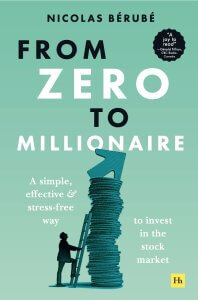Don’t Trust Your Gut
WE OFTEN IMAGINE WE know something about the future that’s unknowable—and the result can be costly investment mistakes. Below is an edited excerpt from the new book "From Zero to Millionaire: A Simple, Effective, and Stress-Free Way to Invest in the Stock Market," published by Harriman House.
“I don’t think the United States is going to survive.”
Several years ago, I was having lunch with a friend in a San Francisco restaurant when he made this confession.
Around us, young waiters brought fair trade espressos and gluten-free bread to customers dressed in relaxed yet sophisticated attire. Near the entrance, yoga mats—rolled up in specialized covers—lay jumbled together like multicolored offerings to the gods of wellness and self-discovery.
I had just said that I was optimistic about the future of the U.S. My friend, apparently, was not.
“The only thing keeping Wall Street alive is the devaluation of the dollar,” he said. “The dollar is no longer backed by gold. The U.S. economy will collapse. There’s no escaping it.”
“It’s been a long time since gold was used as collateral for the U.S. currency,” I replied.
 “Yes, but little by little people are realizing that.”
“Yes, but little by little people are realizing that.”
I asked my friend if he was the type to have canned goods in his basement to be ready in case of disaster.
“We have enough food to last a year,” he said.
I took a bite of hash browns. Behind him, a lady was parking a BMW station wagon along the sidewalk.
“Yep, I’m a prepper,” he added with a smile, able to laugh at himself.
“Do you buy gold?” I asked.
“Of course. But you have to buy physical gold, otherwise it’s worthless. I’m in the process of arranging to have the gold stored. By the way, why do you think the Americans are in Afghanistan? It’s for the rare-earth elements. Same thing with Mali…. A few families control the world banking system…. They support Wall Street…. It’s all going to collapse.”
A decade has passed since our conversation. In that time, U.S. stock markets—which account for more than half of the total value of all stock markets around the world—have quadrupled in value, advancing almost relentlessly in line with corporate productivity and profits.
The price of gold is lower than the day when we had our lunch.
My friend was a brilliant guy who worked in the demanding world of San Francisco technology companies. He was a professional who lived in a nice house in one of the nicest neighborhoods in one of the most admired cities on Earth.
Men behaving badly. I’m not telling this story to show that my friend was wrong. I tell it because, if you talk to people about stock market investments, you’re likely to quickly hear fearmongering. “It’s a casino.” “It’s all going to crash.” “Wake up.”
A few years ago, during a Christmas party, a family member told me that a stock market apocalypse was about to happen.
“I sold everything,” he told me, a bottle of beer in hand, the Christmas tree glittering behind him. “The stock market has gone up a lot and is breaking record after record. I have a bad feeling…. I think the next crash will be as devastating as ever.”
A few months later, one of my neighbors mentioned the same fear. “We’re due for a good drubbing,” he revealed.
As it turned out, they weren’t completely wrong. The market did eventually experience downturns in the years that followed. But the market is now higher than when they made these dark predictions.
My sampling is small and anecdotal, I admit. But around me, it’s almost always men who believe their gut will tell them the future of the markets. And, like the examples cited here, they are mostly highly educated men who are competent in their field and have enviable careers.
This hunch that imminent chaos is about to strike can seduce the bravest person and the most experienced market expert. But this hunch is worthless.
Investing is a strange practice, one that has its origin in a renunciation: To invest is to give up spending money now to have more money later. Why do it? In fact, the question should be: Do we have a choice?
Social Security, employer pensions and income annuities were designed to supplement retirement income, not replace it. The number of employers offering attractive retirement plans is falling. And if you’re self-employed or an entrepreneur, you don’t need me to tell you that you must fund your own lifestyle, which will likely last for decades after you stop working.
Investing has risks. Not investing carries far greater risks. Rather than treading water from paycheck to paycheck, buying financial assets allows us to gain freedom—and enjoy it—throughout our lives. Taking a year off to travel, not needing the bank to buy a car or a home, dealing with a costly contingency in seconds, or making generous donations to those in need, are just some of the superpowers that investors possess.
Taking stock. Because investing isn’t taught in school, many people believe that it’s too complicated, too risky or too abstract, without realizing that investing well is extremely simple, and within virtually everyone’s reach.
As a result, many people buy a house or apartment and pay the mortgage without seeing the value of investing elsewhere. They don’t realize that they’re missing out on an opportunity for wealth that is light years away from the gains that residential real estate can make.
If the gains from the sale of a home are striking, it’s because, for most of us, it is the only time in our lives that we are faced with amounts in the hundreds of thousands of dollars or more. Without a point of comparison, the price of a home, even a modest one, takes on an impressive value that never ceases to fascinate.
Investor Warren Buffett bought his current home in Omaha, Nebraska, in 1958. He paid $31,500 for it. His property is now valued at $700,000. But if he had invested his $31,500 in the stock market instead, that investment would be worth more than $23 million today.
Is it any wonder that Buffett has spent his life buying businesses and not villas, and that he has referred to his house as “Buffett’s folly”?
The reason the rich are getting richer faster than the rest of the population is that they aren’t letting most of their net worth sleep in the walls that protect them from the rain and wind. The rich get richer because they buy financial assets such as stocks and bonds.
For a long time, only the wealthy had the means and contacts to invest in these other types of assets. This is no longer true. Of course, having little money is a hindrance to investing, but not an insurmountable obstacle. Starting to invest $5 a day at age 20 can make us millionaires in retirement. Without taking unnecessary risks. Without reading financial newspapers or becoming a finance nerd.
You don’t need to have worn out the benches of business schools to become a great investor. In fact, the further you are from business schools, the more of an innate advantage you have in growing your money.
Books that teach investing in the stock market often assume that, with the necessary tools to distinguish promising companies, investors can build a portfolio that’ll grow nicely over the years. Yet researchers have shown that our emotions and behavior contribute far more to our success than the value of any publicly traded company. The latest studies also show that spending our energy and time looking for stocks that’ll make us richer will, instead, likely make us poorer.
Indeed, it’s more advantageous to buy the whole haystack than to spend your time looking for the needle. What I’m referring to, of course, is purchasing total stock market index funds. Don’t want to trust your unreliable gut? These funds are the way to go.
 Nicolas Bérubé is an award-winning financial writer and reporter with La Presse, one of Canada’s largest news organizations. He lived in Los Angeles, California, for seven years as the paper’s first western correspondent, has received a National Newspaper Award, and was a finalist for the Michener Awards, one of the highest honors in Canadian journalism. Initially published in French, "De Zéro à Millionnaire" was an instant bestseller in Canada. Nicolas can be reached at nberube@lapresse.ca.
Nicolas Bérubé is an award-winning financial writer and reporter with La Presse, one of Canada’s largest news organizations. He lived in Los Angeles, California, for seven years as the paper’s first western correspondent, has received a National Newspaper Award, and was a finalist for the Michener Awards, one of the highest honors in Canadian journalism. Initially published in French, "De Zéro à Millionnaire" was an instant bestseller in Canada. Nicolas can be reached at nberube@lapresse.ca.
The post Don’t Trust Your Gut appeared first on HumbleDollar.



